Comparison of space communication systems
Friends, as you already know, we are in full swing preparing a new geek project - “Server in the Clouds 2.0”, or “Space Data Center”. In a nutshell: on April 12 we will launch a self-made servochka on a stratosphere balloon at a height of about 30 km, we will transmit data to it through a space communication system, and from the server transmit data to Earth via radio.
And today we want to talk about the three space communication systems that we are testing in our project - Iridium, GlobalStar and Gonets. To do this, we mount the receiving equipment next to our transcendental server.
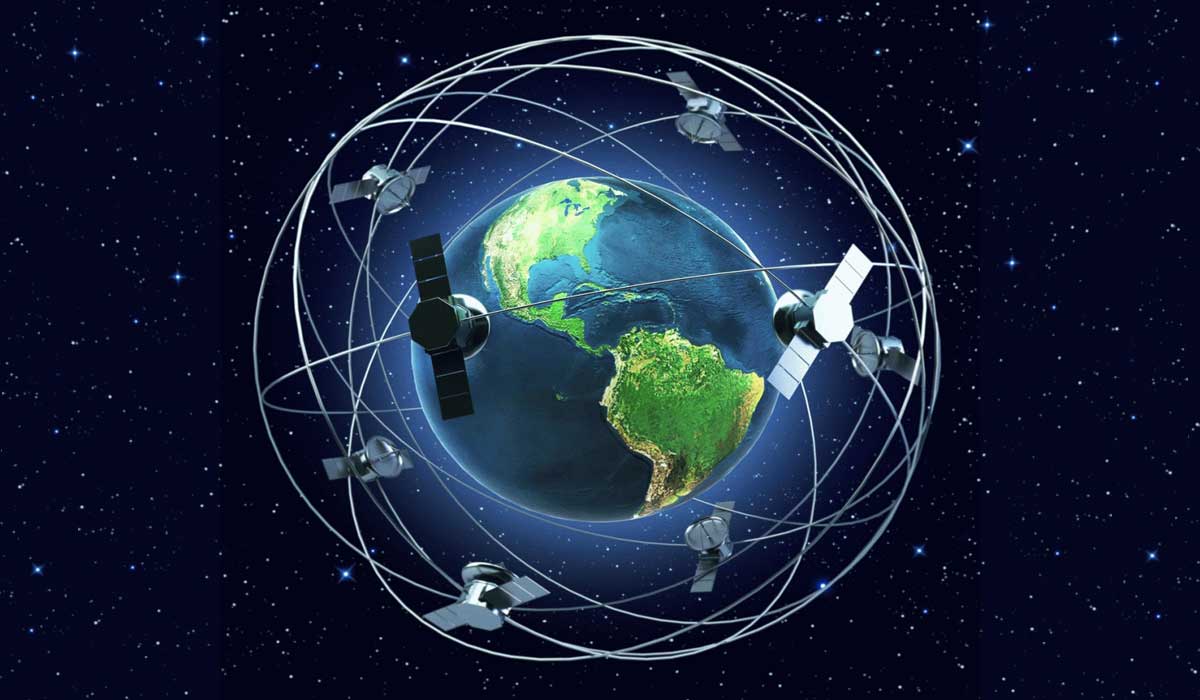
All three systems described were created and deployed at approximately the same time in the 1990s. The American Iridium of them is not only the oldest by design (work started in 1990), but also the largest - it was originally planned to launch 77 satellites, which corresponds to the atomic number of iridium, but today 66 satellites (+ 9 backup) are operating in orbit. Commercial operation of the system began in 1998. In just a year, the company managed to go broke, and in 2000 its assets were bought out by a company operating in the interests of the US Department of Defense. In 2001, commercial operation began again, in 2009 the owner of Iridium changed again. Since then, this satellite communications network has been quite alive and well.
GlobalStar was also based in the USA, although corporations from France, England, Germany and South Korea participate in the project. They began to deploy the satellite constellation in 1998, and in 2000 GlobalStar was launched into commercial operation. Bankruptcy could not be avoided here either; the network changed its owner in the early 2000s. Today, 48 GlobalStar satellites (+ 4 backup) are operating in orbit.
The Russian “Messenger” system is not a private project, but a state one. It began to be developed back in 1989, and launches of the first satellites began in 1996. Initially, it was planned that the constellation would consist of 24 satellites, but today only 12 are in operation. In the coming years, it is planned to launch a couple more dozens of satellites, including the replacement of obsolete ones.
Iridium has the largest coverage with the highest data rates. Its satellites rotate around the Earth at an altitude of 780 km in orbits with an inclination of 86.5 o , and cover the entire surface of the planet, fromear to ear pole to pole.
Now the data transfer rate ideally reaches 352 Kbps for Iridium, and by the end of the year they plan to increase it to 704/352 Kbps (reception and transmission). But the real values, of course, are lower. When communicating with voice, the sound quality is not too good, distortion is observed.
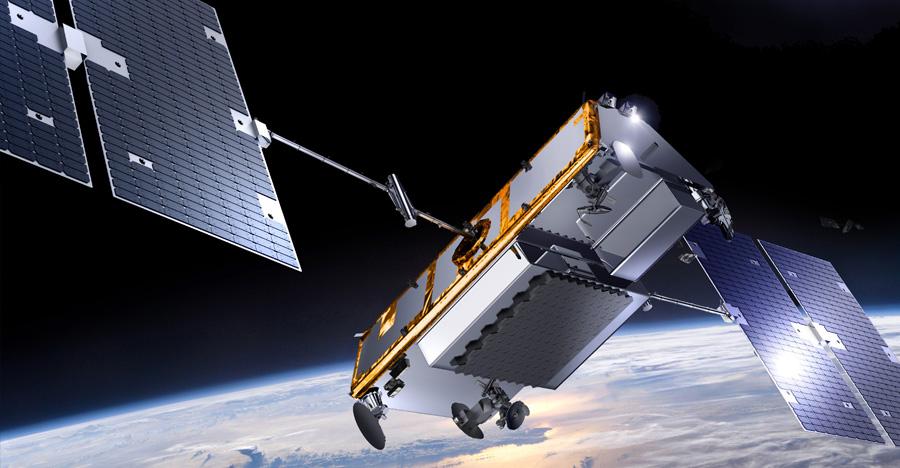
Iridium maintains direct communication between satellites, so formally the system can dispense with numerous gateway stations in different countries for transmitting data to the Internet and landline telephone network, unlike GlobalStar, and instead transfer all traffic through the satellite network to the head gateway station located in USA. However, probably, for the reliability of communication, gateway stations are still being built, though not so much.
Phones for Iridium are some of the most expensive on the market, although they differ in rich equipment and features. Both cellular modems and cellular devices for text communication are available (much cheaper than voice communication). To transfer data through Iridium, in addition to the phone itself, you need a computer on which the Iridium Data Kit proprietary software is installed. Communication services at this satellite network are higher than competitors. For example, an annual voucher for 250 minutes within the Russian Federation - 28,700 rubles., Two-month voucher for 150 minutes around the world - 17,400 rubles. In postpaid tariffs, one minute of conversation is from 58 rubles, SMS is 22 rubles, + a subscription fee of 12,000 rubles (less than six months) and from 3100 rubles. (more than six months). And besides, the company has not yet concluded roaming agreements with anyone, therefore, SIM-cards of GSM-operators cannot be used in Iridium devices,
At GlobalStar, satellites fly at an altitude of 1400 km and have an orbital inclination of 52 o . Satellites do not exchange data with each other, therefore, the system also includes a network of gateway stations, which are the connecting link between relay satellites, the Internet and the terrestrial telephone network.
Iridium satellites are shown in red, GlobalStar in blue:
GlobalStar’s communications coverage is more modest - up to 70 o north and south latitude, that is, the polar regions are not covered by this network. However, according to reviews, coverage at other latitudes is unstable. Although if the satellite is in direct line of sight, then you will not have communication problems. GlobalStar's data transfer speed is lower than that of Iridium, but the sound quality during voice communication is comparable to talking on a cell phone.

Formally, the network supports CDMA and GSM standards, but in practice, not all gateway stations work with GSM, although this is not relevant for our country. In most countries, you can insert SIM-cards of "ordinary" mobile operators into phones compatible with GlobalStar. Devices for GlobalStar are noticeably cheaper than for Iridium. On sale there are telephones of various degrees of advancement, a gadget for text communication with a mechanical keyboard, hotspots, trackers for installation on vehicles or personal wearing, and much more. There is no subscription fee, and communication services cost less than Iridium: for example, a package for calls in the Russian Federation for six months and 250 minutes - 9,800 rubles, in postpaid tariffs a minute from 44 rubles, SMS - 4 rubles, Internet access - from 13 rub.
The satellites of this system revolve around the planet at an altitude of 1,500 km in orbits with an inclination of 82.5 o . As a result, the Earth’s surface coverage is complete, but not at the same time.
On the territory of Russia, 3 gateway stations have been built (and one is planned) that connect the satellite constellation with the Internet.
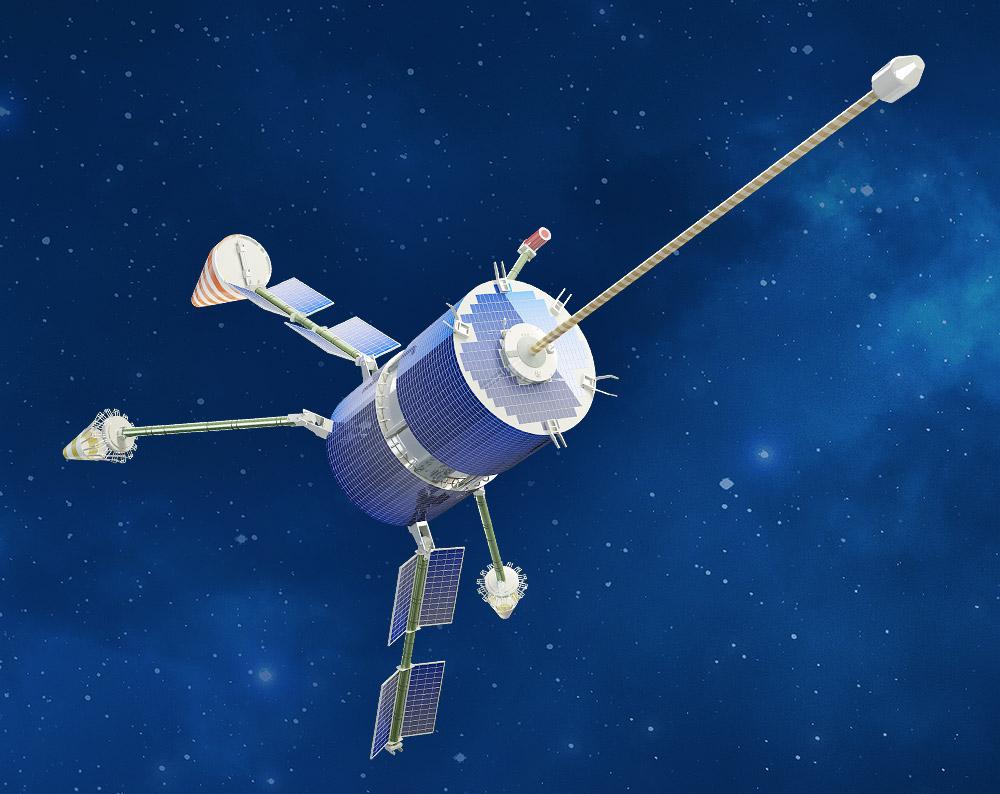
It is curious that the “Messenger” does not compete with other systems in the field of voice communications. Instead, the Russian project specializes in text messaging. To do this, you need to purchase a subscriber device and antenna, and connect a smartphone, laptop or desktop computer to them. In short, the introvert's dream is all communication is only in the chat room and there are no unexpected calls for you.
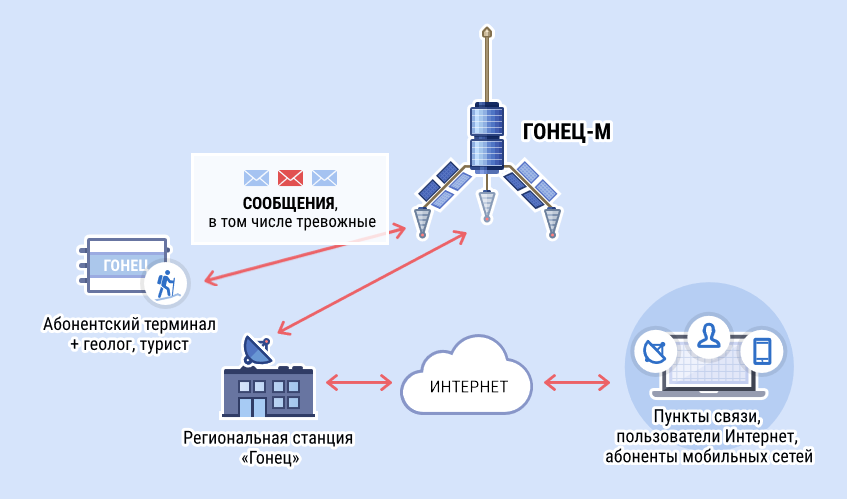
The Messenger also offers M2M communication services for automatic monitoring of the status and telemetry of various objects, stationary and mobile.
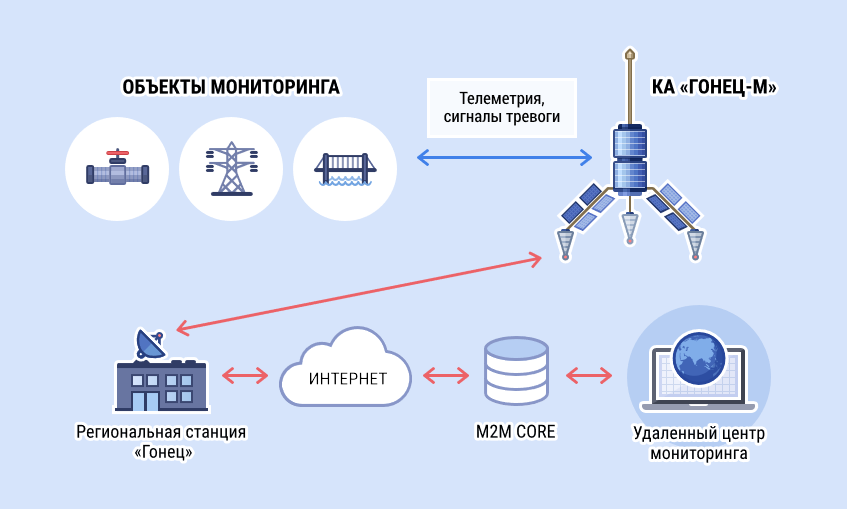
And plus additional services like relaying the geo-coordinates of transport and sending alerts.
Communication services in the network are paid on the basis of a monthly fee - in fact, these are prepaid monthly packets of kilobytes of traffic. For example, with a zero monthly fee they charge 26 rubles each. for every kilobyte of data transferred, and there are a number of packages from 470 rubles. (30 Kb) up to 8 650 rubles. (2,000 Kb). Plus 10 rubles for each outgoing message to the cellular networks of the Russian Federation. Each kilobyte over the limit is paid separately, from 11 to 26 rubles.
Our hoteliers have the following: equip a "sky-high" server with a tracker for tracking location, and a module for exchanging data via satellite. Theoretically, these features can offer all three networks. We have already purchased Iridium and GlobalStar modems, and the device from the “Messenger" is coming to us. We will definitely tell you more about our communication system in one of the future publications. In the meantime, we invite you to take part in our experiment, guess the touchdown point of the probe and win the main prize - a trip to Baikonur. Do not disconnect!


And today we want to talk about the three space communication systems that we are testing in our project - Iridium, GlobalStar and Gonets. To do this, we mount the receiving equipment next to our transcendental server.

Short story
All three systems described were created and deployed at approximately the same time in the 1990s. The American Iridium of them is not only the oldest by design (work started in 1990), but also the largest - it was originally planned to launch 77 satellites, which corresponds to the atomic number of iridium, but today 66 satellites (+ 9 backup) are operating in orbit. Commercial operation of the system began in 1998. In just a year, the company managed to go broke, and in 2000 its assets were bought out by a company operating in the interests of the US Department of Defense. In 2001, commercial operation began again, in 2009 the owner of Iridium changed again. Since then, this satellite communications network has been quite alive and well.
GlobalStar was also based in the USA, although corporations from France, England, Germany and South Korea participate in the project. They began to deploy the satellite constellation in 1998, and in 2000 GlobalStar was launched into commercial operation. Bankruptcy could not be avoided here either; the network changed its owner in the early 2000s. Today, 48 GlobalStar satellites (+ 4 backup) are operating in orbit.
The Russian “Messenger” system is not a private project, but a state one. It began to be developed back in 1989, and launches of the first satellites began in 1996. Initially, it was planned that the constellation would consist of 24 satellites, but today only 12 are in operation. In the coming years, it is planned to launch a couple more dozens of satellites, including the replacement of obsolete ones.
Features and Features
Iridium
Iridium has the largest coverage with the highest data rates. Its satellites rotate around the Earth at an altitude of 780 km in orbits with an inclination of 86.5 o , and cover the entire surface of the planet, from
Now the data transfer rate ideally reaches 352 Kbps for Iridium, and by the end of the year they plan to increase it to 704/352 Kbps (reception and transmission). But the real values, of course, are lower. When communicating with voice, the sound quality is not too good, distortion is observed.

Iridium maintains direct communication between satellites, so formally the system can dispense with numerous gateway stations in different countries for transmitting data to the Internet and landline telephone network, unlike GlobalStar, and instead transfer all traffic through the satellite network to the head gateway station located in USA. However, probably, for the reliability of communication, gateway stations are still being built, though not so much.
Phones for Iridium are some of the most expensive on the market, although they differ in rich equipment and features. Both cellular modems and cellular devices for text communication are available (much cheaper than voice communication). To transfer data through Iridium, in addition to the phone itself, you need a computer on which the Iridium Data Kit proprietary software is installed. Communication services at this satellite network are higher than competitors. For example, an annual voucher for 250 minutes within the Russian Federation - 28,700 rubles., Two-month voucher for 150 minutes around the world - 17,400 rubles. In postpaid tariffs, one minute of conversation is from 58 rubles, SMS is 22 rubles, + a subscription fee of 12,000 rubles (less than six months) and from 3100 rubles. (more than six months). And besides, the company has not yet concluded roaming agreements with anyone, therefore, SIM-cards of GSM-operators cannot be used in Iridium devices,
Globalstar
At GlobalStar, satellites fly at an altitude of 1400 km and have an orbital inclination of 52 o . Satellites do not exchange data with each other, therefore, the system also includes a network of gateway stations, which are the connecting link between relay satellites, the Internet and the terrestrial telephone network.
Iridium satellites are shown in red, GlobalStar in blue:
GlobalStar’s communications coverage is more modest - up to 70 o north and south latitude, that is, the polar regions are not covered by this network. However, according to reviews, coverage at other latitudes is unstable. Although if the satellite is in direct line of sight, then you will not have communication problems. GlobalStar's data transfer speed is lower than that of Iridium, but the sound quality during voice communication is comparable to talking on a cell phone.

Formally, the network supports CDMA and GSM standards, but in practice, not all gateway stations work with GSM, although this is not relevant for our country. In most countries, you can insert SIM-cards of "ordinary" mobile operators into phones compatible with GlobalStar. Devices for GlobalStar are noticeably cheaper than for Iridium. On sale there are telephones of various degrees of advancement, a gadget for text communication with a mechanical keyboard, hotspots, trackers for installation on vehicles or personal wearing, and much more. There is no subscription fee, and communication services cost less than Iridium: for example, a package for calls in the Russian Federation for six months and 250 minutes - 9,800 rubles, in postpaid tariffs a minute from 44 rubles, SMS - 4 rubles, Internet access - from 13 rub.
"Messenger"
The satellites of this system revolve around the planet at an altitude of 1,500 km in orbits with an inclination of 82.5 o . As a result, the Earth’s surface coverage is complete, but not at the same time.
On the territory of Russia, 3 gateway stations have been built (and one is planned) that connect the satellite constellation with the Internet.

It is curious that the “Messenger” does not compete with other systems in the field of voice communications. Instead, the Russian project specializes in text messaging. To do this, you need to purchase a subscriber device and antenna, and connect a smartphone, laptop or desktop computer to them. In short, the introvert's dream is all communication is only in the chat room and there are no unexpected calls for you.

The Messenger also offers M2M communication services for automatic monitoring of the status and telemetry of various objects, stationary and mobile.

And plus additional services like relaying the geo-coordinates of transport and sending alerts.
Communication services in the network are paid on the basis of a monthly fee - in fact, these are prepaid monthly packets of kilobytes of traffic. For example, with a zero monthly fee they charge 26 rubles each. for every kilobyte of data transferred, and there are a number of packages from 470 rubles. (30 Kb) up to 8 650 rubles. (2,000 Kb). Plus 10 rubles for each outgoing message to the cellular networks of the Russian Federation. Each kilobyte over the limit is paid separately, from 11 to 26 rubles.
What should we choose?
Our hoteliers have the following: equip a "sky-high" server with a tracker for tracking location, and a module for exchanging data via satellite. Theoretically, these features can offer all three networks. We have already purchased Iridium and GlobalStar modems, and the device from the “Messenger" is coming to us. We will definitely tell you more about our communication system in one of the future publications. In the meantime, we invite you to take part in our experiment, guess the touchdown point of the probe and win the main prize - a trip to Baikonur. Do not disconnect!


